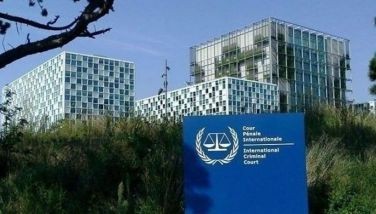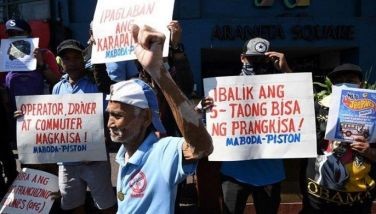YEARENDER: Gov’t to step up drive on natural resources conservation
MANILA, Philippines - The devastation wrought by Typhoon Yolanda has compelled the government to step up its campaign for the conservation of protected natural areas of resources and the promotion of ecotourism.
Secretary Ramon Paje of the Department of Environment and Natural Resources said the two areas must complement each other.
“Ecotourism provides an added value by being one of the most established revenue sources for the country. It maximizes the beauty of our coasts and supports communities by providing source of livelihood. It then ploughs back income to the protection of the environment,” Paje said.
He said the government has allotted P1 billion ($22 million) for mangrove and beach forest development in disaster-risk areas, covering not only those hit by Typhoon Yolanda but also those affected by the magnitude 7.2 earthquake in Bohol and Cebu.
The fund aims to provide socio-economic benefits to calamity-stricken communities and mitigate the negative impact of climate change.
In the wake of Yolanda last year, the government has adopted measures that will be part of a comprehensive program on environmental protection.
“Sustainable resource-use strategies will be promoted throughout the country, wherein one of the key activities is ecotourism development,” Paje said.
He underscored the need to provide alternative livelihood to people in coastal communities to curb the country’s high dependence on marine resources and practices that lead to the devastation of the ecosystem.
“In the case of Yolanda, it is clear that due to lack of natural barriers in the coastlines, communities were destroyed by storm surges as high as five meters and tsunami-like waves,” he said.
In February, the DENR announced that it is putting ecotourism at the forefront of its development priorities to help coastal communities affected by Yolanda.
“This is part of a bigger program of restoring the integrity of our ecosystem,” Paje said.
On the other hand, given the outbreak of the deadly Ebola virus in West Africa, Paje has alerted wildlife authorities since late August against illegal entry and smuggling of wild animals from Africa into the country.
He tasked personnel at airports and seaports to strictly monitor all imported wild animals and exotic pets, particularly those coming from Guinea, Sierra Leone and Liberia.
He said the Ebola virus is a “zoonotic” disease transmitted to humans by direct contact with infected live or dead animals.
In Africa, infection has been documented through the handling of infected chimpanzees, gorillas, fruit bats, monkeys, forest antelope and porcupines found ill or dead or in the forest.
The DENR has stopped issuing permits for wild animals imported from Africa as early as 2006.
“No import permit has been issued by the DENR since 2006 for this purpose, so any shipment from any part of Africa is outright illegal,” Paje said.
At the same time, the environment chief reiterated his call on the public to refrain from keeping wild animals as pets, given their potential serious risk to human health.
“Keeping wild and exotic animals as pets threaten public health and safety. These animals can be carriers of diseases that spread between animals and humans,” Paje warned.
The DENR also condemned the killing of an adult female Philippine eagle found dead on Mt. Apo in Davao City, also in August, leaving an eaglet behind.
Paje immediately ordered regional environment officials in Davao to investigate the incident and seek police and local government assistance in tracking down the perpetrator and cause the filing of criminal charges against him.
“It is sad to think that while we are trying to save the endangered Philippine eagle from extinction, there are those who are undermining our efforts,” he said.
The eagle, which had apparently been felled by a bullet, was among those being monitored by the DENR and the Philippine Eagle Foundation for years.
“The DENR will do everything to ensure that the seven-month-old eaglet will survive through its fledgling stage,” Paje said.
The Philippine eagle is considered one of the biggest, rarest and most powerful birds in the world – the reason it has been declared the Philippine national bird.
It is critically endangered, mainly due to massive loss of habitat caused by deforestation.
Hunting and killing of the Philippine eagle is punishable under Republic Act 6147 or the Wildlife Resources Conservation and Protection Act by 12 years in jail and heavy fines.
Geohazard maps
Also recently, the DENR distributed larger-scale and more detailed geohazard maps to towns affected by Yolanda.
The maps, which indicate areas susceptible to floods and landslides, are important tools in disaster risk reduction and management.
“With the 1:10,000 scale geohazard maps, the degree of vulnerability to floods and landslides can be determined in a given area. These maps, which are more detailed and precise, will enable national and local authorities to see clearly what’s on the ground,” Paje explained.
“Local government units (LGUs) bear the principal responsibility for disaster response, and we hope they will use the maps as an evaluation tool to plan their resettlement and rebuilding efforts,” he said. “With these maps, local executives, their barangays and other concerned agencies are now in a better position to craft their disaster management plans and programs.”
The DENR launched the detailed geohazard mapping program in 2011 following the completion of the nationwide mapping at a scale of 1:50,000.
The DENR has allocated some P354 million for the conduct of the detailed geohazard mapping in various disaster-prone areas in the country as part of the agency’s efforts to enhance the preparedness of LGUs to implement mitigation measures against natural disasters.
Paje expressed confidence that the government has put in place adequate long-term measures to counter the effects of climate change.
‘Dugong’ saved
The early part of 2014 saw DENR trying to save a neonate, male dugong (manatee or seacow) that got stranded in waters off Barangay Binulasan in Infanta, Quezon.
Director Mundita Lim of the DENR’s Biodiversity Management Bureau said the dugong, which measured 1.06 meters long, got stranded due to low tide.
The dugong named Binu was found beached by two local fishermen early morning of Jan. 9.
The rescued dugong was temporarily transferred to the nearby barangay of Dinahican, also in Infanta, to shield it from strong waves.
Dugongs belong to the animal group Sirenia. Like dolphins and whales, dugongs are air-breathing marine mammals.
“They could not stay long underwater; they have to surface from the water to breathe. Since they could not swim fast, they are an easy target of poachers who hunt them with nets, dynamite or spear guns,” Lim stressed.
Dugongs swim at a speed of five kilometers per hour.
Lim explained that dugongs are classified as a “critically endangered species” and the government prohibits their hunting, trading, transporting or possession by virtue of Republic Act 9147, also known as the Wildlife Resources Conservation and Protection Act, violation of which is punishable with imprisonment from six to 12 years and/or a fine from P100,000 to P1 million.
The DENR urged coastal residents to immediately report any dugong stranding to its nearest office.
The dugong eventually died after its weight dropped to 18 kilos and its breathing became erratic.
- Latest
- Trending






























